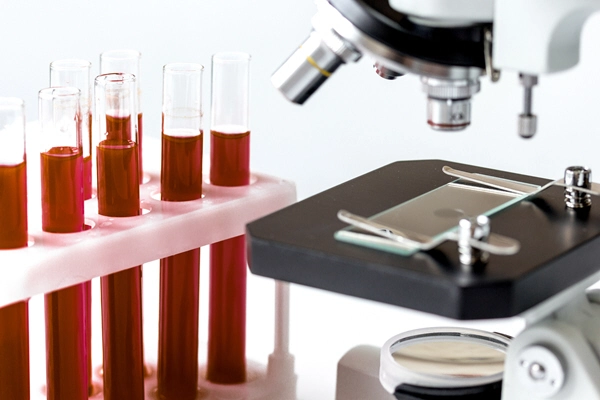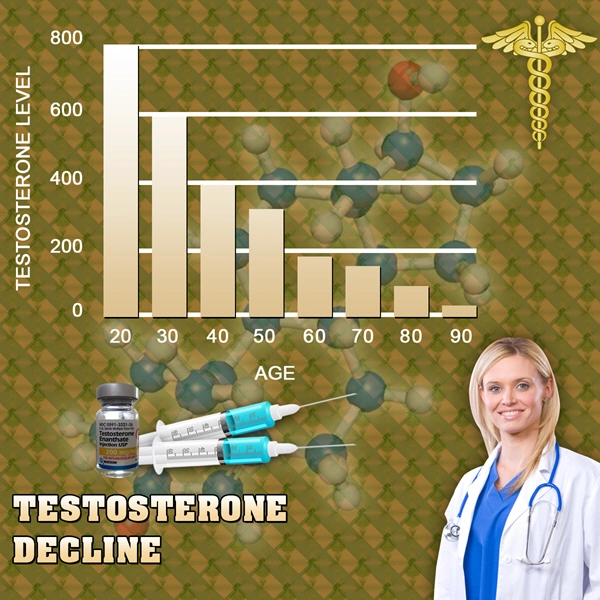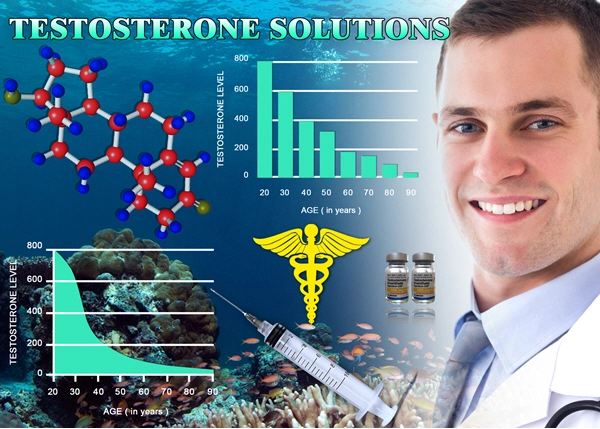Introduction to Testosterone and Aging
Testosterone, often dubbed the quintessential male hormone, plays a pivotal role in the health and vitality of American men. As men age, the natural decline in testosterone levels can usher in a myriad of changes, both physical and psychological. Understanding and embracing these changes is crucial for maintaining a high quality of life. This article delves into the science of testosterone, its impact on aging, and strategies for American males to navigate this transition with confidence.
The Science of Testosterone
Testosterone is a steroid hormone primarily produced in the testicles. It is instrumental in the development of male reproductive tissues such as the testes and prostate, as well as promoting secondary sexual characteristics such as increased muscle and bone mass, and the growth of body hair. In American males, testosterone levels typically peak during adolescence and early adulthood, gradually declining after the age of 30 at a rate of about 1% per year.
Impact of Declining Testosterone Levels
The decline in testosterone can manifest in various ways, impacting muscle strength, bone density, fat distribution, and even mood and cognitive function. Symptoms such as fatigue, decreased libido, erectile dysfunction, and mood swings are commonly reported. For American men, understanding these symptoms is the first step toward managing them effectively.
Embracing Change with Confidence
Aging is an inevitable process, but it does not have to diminish one's quality of life. American males can embrace the changes brought about by declining testosterone levels with confidence by adopting a proactive approach to health and wellness. This includes regular exercise, a balanced diet, and maintaining a healthy lifestyle.
Exercise and Physical Activity
Regular physical activity, particularly strength training and resistance exercises, can help mitigate the effects of declining testosterone. Exercise not only helps maintain muscle mass and bone density but also boosts mood and overall well-being. American men are encouraged to incorporate at least 150 minutes of moderate aerobic activity or 75 minutes of vigorous activity per week, along with muscle-strengthening exercises on two or more days a week.
Nutrition and Diet
A balanced diet rich in vitamins and minerals is essential for maintaining optimal testosterone levels. Foods high in zinc, such as oysters and beef, and vitamin D, found in fatty fish and fortified foods, have been shown to support testosterone production. American males should aim for a diet that includes a variety of fruits, vegetables, lean proteins, and whole grains to support overall health and hormone balance.
Lifestyle and Mental Health
Lifestyle factors such as adequate sleep, stress management, and avoiding excessive alcohol and tobacco use are crucial for maintaining healthy testosterone levels. Additionally, addressing mental health is vital, as depression and anxiety can exacerbate the symptoms of low testosterone. American men are encouraged to seek support from healthcare professionals if they experience persistent mood changes or other symptoms.
Medical Interventions
For some American men, lifestyle changes alone may not be sufficient to manage the symptoms of low testosterone. In such cases, medical interventions such as testosterone replacement therapy (TRT) may be considered. TRT can help restore testosterone levels to a more youthful range, alleviating symptoms and improving quality of life. However, it is important to consult with a healthcare provider to discuss the benefits and risks of TRT and determine if it is the right option.
Conclusion: Embracing the Journey
Aging with declining testosterone levels is a journey that American males can navigate with confidence and grace. By understanding the science behind testosterone, embracing lifestyle changes, and seeking appropriate medical interventions when necessary, men can maintain their vitality and enjoy a fulfilling life at every stage. The art of aging is not just about accepting change but thriving amidst it, and with the right approach, American men can do just that.

- Unlocking Vigor: Testosterone, The Quintessential Powering Force of Masculinity [Last Updated On: February 25th, 2025] [Originally Added On: February 25th, 2025]
- Hormonal Harmony: The Orchestra Conductor of Life - Testosterone [Last Updated On: February 26th, 2025] [Originally Added On: February 26th, 2025]
- A Chronological Expedition: Testosterone's Mysterious and Pivotal Voyage Across Human History [Last Updated On: February 27th, 2025] [Originally Added On: February 27th, 2025]
- The Unseen Power: Unveiling the Unsuspected Advantages of Robust Testosterone Levels [Last Updated On: February 28th, 2025] [Originally Added On: February 28th, 2025]
- Demystifying Testosterone: A Comprehensive Exploration of Fact and Fiction [Last Updated On: February 28th, 2025] [Originally Added On: February 28th, 2025]
- Harnessing the Vigor of Life: Decoding the Influence of Testosterone [Last Updated On: March 1st, 2025] [Originally Added On: March 1st, 2025]
- Exploring Nutritional Strategies for Testosterone Enhancement [Last Updated On: March 2nd, 2025] [Originally Added On: March 2nd, 2025]
- Enhancing Testosterone Levels Through Exercise: Mechanisms, Types of Exercises, and Age-Related Considerations [Last Updated On: March 3rd, 2025] [Originally Added On: March 3rd, 2025]
- Understanding Testosterone's Role in Cognitive Function and Mood [Last Updated On: March 4th, 2025] [Originally Added On: March 4th, 2025]
- Unveiling the Vital Role of Testosterone in Women's Health: A Comprehensive Overview [Last Updated On: March 4th, 2025] [Originally Added On: March 4th, 2025]
- Understanding Testosterone's Role in Male Health and Reproductive Function [Last Updated On: March 5th, 2025] [Originally Added On: March 5th, 2025]
- Genetics and Testosterone: Predestined Levels or Modifiable by Lifestyle? [Last Updated On: March 5th, 2025] [Originally Added On: March 5th, 2025]
- Testosterone's Crucial Role in Male Development and Health Across Lifespan [Last Updated On: March 6th, 2025] [Originally Added On: March 6th, 2025]
- Optimizing Testosterone Levels: Lifestyle Strategies for Health and Vitality [Last Updated On: March 7th, 2025] [Originally Added On: March 7th, 2025]
- Optimizing Men's Health: Advances in Testosterone Replacement Therapy and Personalized Approaches [Last Updated On: March 8th, 2025] [Originally Added On: March 8th, 2025]
- Managing Testosterone Decline in Men: Strategies for Health and Vitality as You Age [Last Updated On: March 9th, 2025] [Originally Added On: March 9th, 2025]
- Unveiling the Nightly Ritual: How Sleep Boosts Testosterone in American Men [Last Updated On: March 12th, 2025] [Originally Added On: March 12th, 2025]
- Unlocking the Potential of Testosterone: Pioneering Advances in Hormonal Health for American Males [Last Updated On: March 13th, 2025] [Originally Added On: March 13th, 2025]
- Unraveling the Interplay of Stress, Cortisol, and Testosterone: A Guide to Hormonal Harmony for American Males [Last Updated On: March 13th, 2025] [Originally Added On: March 13th, 2025]
- Unleashing Potential: The Role of Testosterone in Athletic Performance Among American Males [Last Updated On: March 15th, 2025] [Originally Added On: March 15th, 2025]
- Testosterone's Impact on Metabolism and Fat Burning in American Males [Last Updated On: March 18th, 2025] [Originally Added On: March 18th, 2025]
- Boosting Testosterone: Supplements, Herbs, Diet, and Exercise Strategies for American Males [Last Updated On: March 18th, 2025] [Originally Added On: March 18th, 2025]
- Testosterone's Impact on Heart Health in American Men: Risks, Therapy, and Lifestyle [Last Updated On: March 18th, 2025] [Originally Added On: March 18th, 2025]
- Testosterone's Crucial Role in Maintaining Bone Density in American Males [Last Updated On: March 19th, 2025] [Originally Added On: March 19th, 2025]
- Testosterone's Role in Enhancing Workplace Productivity and Cognitive Function [Last Updated On: March 19th, 2025] [Originally Added On: March 19th, 2025]
- Testosterone's Role in Male Libido: Strategies for Enhancing Sexual Health [Last Updated On: March 19th, 2025] [Originally Added On: March 19th, 2025]
- Low Testosterone in Men: Causes, Symptoms, and Effective Treatment Options [Last Updated On: March 20th, 2025] [Originally Added On: March 20th, 2025]
- Environmental Toxins and Their Impact on Testosterone Levels in American Males [Last Updated On: March 20th, 2025] [Originally Added On: March 20th, 2025]
- Testosterone's Impact on Mood, Memory, and Motivation in American Males [Last Updated On: March 21st, 2025] [Originally Added On: March 21st, 2025]
- Testosterone's Role in Immune Health and Protection in American Males [Last Updated On: March 21st, 2025] [Originally Added On: March 21st, 2025]
- Achieving Hormonal Harmony: Testosterone's Interplay in Men's Health [Last Updated On: March 22nd, 2025] [Originally Added On: March 22nd, 2025]
- Meditation's Impact on Testosterone Levels in American Males: Benefits and Practices [Last Updated On: March 22nd, 2025] [Originally Added On: March 22nd, 2025]
- Resistance Training Boosts Testosterone: Benefits and Strategies for American Males [Last Updated On: March 22nd, 2025] [Originally Added On: March 22nd, 2025]
- Navigating Testosterone Concerns: Preparation, Communication, and Management Strategies [Last Updated On: March 22nd, 2025] [Originally Added On: March 22nd, 2025]
- Optimal Testosterone Levels: Importance, Monitoring, and Natural Enhancement Strategies for American Males [Last Updated On: March 22nd, 2025] [Originally Added On: March 22nd, 2025]
- Testosterone's Role in Enhancing Cardiovascular Health in American Males [Last Updated On: March 23rd, 2025] [Originally Added On: March 23rd, 2025]
- Andropause: Understanding Male Menopause and Testosterone Decline in American Men [Last Updated On: March 23rd, 2025] [Originally Added On: March 23rd, 2025]
- Urban vs. Rural Living: Impacts on Testosterone Levels in American Males [Last Updated On: March 23rd, 2025] [Originally Added On: March 23rd, 2025]
- Testosterone Monitoring: Empowering Men with Health Apps and Wearables [Last Updated On: March 23rd, 2025] [Originally Added On: March 23rd, 2025]
- Intermittent Fasting: A Promising Method to Boost Testosterone in American Males [Last Updated On: March 24th, 2025] [Originally Added On: March 24th, 2025]
- Testosterone's Impact on Ambition and Competitiveness in American Men [Last Updated On: March 24th, 2025] [Originally Added On: March 24th, 2025]
- Testosterone Revolution: Redefining Masculinity and Health in the 21st Century [Last Updated On: March 24th, 2025] [Originally Added On: March 24th, 2025]
- Testosterone's Role in Muscle Recovery for American Males: Strategies and Insights [Last Updated On: March 24th, 2025] [Originally Added On: March 24th, 2025]
- Testosterone's Impact on Mental Health and Cognitive Function in American Men [Last Updated On: March 25th, 2025] [Originally Added On: March 25th, 2025]
- Boosting Testosterone: Diet, Exercise, Sleep, and Stress Management for American Males [Last Updated On: March 25th, 2025] [Originally Added On: March 25th, 2025]
- Hormonal Health for American Males: Understanding and Boosting Testosterone Levels [Last Updated On: March 25th, 2025] [Originally Added On: March 25th, 2025]
- Social Interactions Impact Testosterone Levels in American Males: Health Implications [Last Updated On: March 25th, 2025] [Originally Added On: March 25th, 2025]
- Testosterone's Role in Longevity: Insights for American Males [Last Updated On: March 25th, 2025] [Originally Added On: March 25th, 2025]
- Testosterone's Crucial Role in Enhancing Mental Resilience in American Men [Last Updated On: March 25th, 2025] [Originally Added On: March 25th, 2025]
- Music and Art Boost Testosterone in American Men: A Holistic Approach [Last Updated On: March 25th, 2025] [Originally Added On: March 25th, 2025]
- Testosterone Management for American Males: Lifestyle, Diet, and Medical Insights [Last Updated On: March 25th, 2025] [Originally Added On: March 25th, 2025]
- Boosting Testosterone: The Vital Role of Outdoor Activities for American Males [Last Updated On: March 26th, 2025] [Originally Added On: March 26th, 2025]
- Positivity Boosts Testosterone: Strategies for American Men's Hormonal Health [Last Updated On: March 26th, 2025] [Originally Added On: March 26th, 2025]
- Testosterone's Impact on Sleep: Strategies for American Males to Enhance Rest [Last Updated On: March 26th, 2025] [Originally Added On: March 26th, 2025]
- Boost Testosterone Naturally: Effective Home Workouts with Resistance Bands [Last Updated On: March 26th, 2025] [Originally Added On: March 26th, 2025]
- Modern American Diets and Their Impact on Men's Testosterone Levels: Strategies for Optimization [Last Updated On: March 26th, 2025] [Originally Added On: March 26th, 2025]
- Managing Testosterone Levels in American Males with Chronic Diseases: A Holistic Approach [Last Updated On: March 26th, 2025] [Originally Added On: March 26th, 2025]
- Testosterone's Impact on Body Image and Self-Esteem in American Males [Last Updated On: March 26th, 2025] [Originally Added On: March 26th, 2025]
- Testosterone Replacement Therapy: Benefits, Risks, and Long-Term Considerations for Men [Last Updated On: March 26th, 2025] [Originally Added On: March 26th, 2025]
- Personalized Testosterone Therapy: Tailoring Treatment to Genetic Profiles for American Men [Last Updated On: March 26th, 2025] [Originally Added On: March 26th, 2025]
- Testosterone's Influence on Risk-Taking in American Men: Biological and Cultural Insights [Last Updated On: March 27th, 2025] [Originally Added On: March 27th, 2025]
- Optimizing Testosterone: Sleep, Nutrition, Exercise, and Lifestyle for American Men's Health [Last Updated On: March 27th, 2025] [Originally Added On: March 27th, 2025]
- Testosterone's Impact on Cognitive Function in American Males: Insights and Implications [Last Updated On: March 27th, 2025] [Originally Added On: March 27th, 2025]
- Optimizing Testosterone with Vitamins D, Zinc, Magnesium, and K2 in American Males [Last Updated On: March 28th, 2025] [Originally Added On: March 28th, 2025]
- Economic Impact of Low Testosterone: Healthcare Costs, Productivity Loss, and Societal Burden [Last Updated On: March 28th, 2025] [Originally Added On: March 28th, 2025]
- Declining Testosterone in American Males: Trends, Causes, and Health Strategies [Last Updated On: March 28th, 2025] [Originally Added On: March 28th, 2025]
- Gut Health's Impact on Testosterone: A Guide for American Males [Last Updated On: March 29th, 2025] [Originally Added On: March 29th, 2025]
- Testosterone Research Evolution: From Lab Discoveries to Clinical Impacts on Men's Health [Last Updated On: March 30th, 2025] [Originally Added On: March 30th, 2025]
- Testosterone in Sports: Myths, Facts, and Future Research for American Males [Last Updated On: March 30th, 2025] [Originally Added On: March 30th, 2025]
- Testosterone's Impact on Male Skin, Hair Health, and Management Strategies [Last Updated On: March 31st, 2025] [Originally Added On: March 31st, 2025]
- Emerging Technologies Revolutionize Testosterone Optimization in Men's Health [Last Updated On: March 31st, 2025] [Originally Added On: March 31st, 2025]
- Testosterone's Impact on Immune Health: Insights for American Men's Well-being [Last Updated On: March 31st, 2025] [Originally Added On: March 31st, 2025]
- Alcohol and Smoking: Impacts on Testosterone Levels in American Males [Last Updated On: April 2nd, 2025] [Originally Added On: April 2nd, 2025]
- Testosterone's Crucial Role in Men's Sexual Health and Well-being [Last Updated On: April 3rd, 2025] [Originally Added On: April 3rd, 2025]
- Body Composition and Testosterone: A Guide for American Males' Health Optimization [Last Updated On: April 5th, 2025] [Originally Added On: April 5th, 2025]
- Mindfulness Boosts Testosterone: Meditation, Yoga, and Lifestyle for American Men's Health [Last Updated On: April 5th, 2025] [Originally Added On: April 5th, 2025]
- Testosterone's Role in Social Dominance Among American Males: Evolutionary and Modern Insights [Last Updated On: April 8th, 2025] [Originally Added On: April 8th, 2025]
- Seasonal Testosterone Fluctuations: Impact and Management Strategies for American Males [Last Updated On: April 8th, 2025] [Originally Added On: April 8th, 2025]
- Acupuncture's Role in Enhancing Testosterone Levels for American Males [Last Updated On: April 9th, 2025] [Originally Added On: April 9th, 2025]
- HIIT Boosts Testosterone: A Guide for American Males [Last Updated On: April 9th, 2025] [Originally Added On: April 9th, 2025]



List of USA state clinics - click a flag below for blood testing clinics.
Word Count: 620



















































